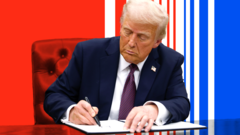In a decicive parliamentary election held in Germany, centrist conservatives emerged victorious, signaling a shift in leadership as voters expressed discontent with the previous government's handling of economic and immigration issues. Friedrich Merz, leader of the Christian Democratic Union (CDU), is now anticipated to become the next chancellor, needing to forge alliances to secure a governing coalition. His campaign focused on economic revitalization, proposing tax cuts and regulatory reforms, while also taking a firmer stance on immigration.
Friedrich Merz's Victory: What This Means for Germany and Europe

Friedrich Merz's Victory: What This Means for Germany and Europe
After a tumultuous electoral period, Friedrich Merz is poised to lead Germany, raising questions about future governance and international relations.
Merz's election also bears significance on a broader European context, particularly given the changing dynamics of U.S. international partnerships under President Trump. His commitment to strengthening Germany's leadership in Europe and supporting Ukraine amidst geopolitical tensions suggests a potential recalibration of Germany's foreign policy approach. This victory arrives at a critical juncture, as Europe grapples with uncertainties due to U.S. political shifts and increasing dissension among member states.
While Merz's win is celebrated by some, it raises concerns regarding the inclusion of far-right elements within Germany’s political landscape that could redefine national and European policies. His previously criticized remarks about Trump's influence and the challenges that lie ahead indicate a complex path for governance and international engagement.
As Germany transitions towards new leadership, the implications of Merz’s chancellorship could resonate far beyond its borders, especially in shaping future European responses to global challenges.
While Merz's win is celebrated by some, it raises concerns regarding the inclusion of far-right elements within Germany’s political landscape that could redefine national and European policies. His previously criticized remarks about Trump's influence and the challenges that lie ahead indicate a complex path for governance and international engagement.
As Germany transitions towards new leadership, the implications of Merz’s chancellorship could resonate far beyond its borders, especially in shaping future European responses to global challenges.





















